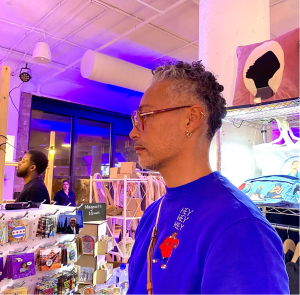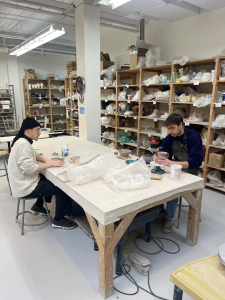MARIO VARGAS-MARÍN, 21, was born in Costa Rica and studies Audio Arts and Acoustics at Columbia College Chicago. He identifies as a white male but feels more comfortable identifying with his Costa Rican and Puerto Rican background. In October 2019, Vargas-Marín became a citizen of the United States.
What do you think of the term Latinx to identify people of Latin America or Spanish background?
I find that this term is incredibly progressive and incredibly helpful, mostly because there are certain Latinx members that don’t identify with the gender male or female. It’s very important to include them and make them feel safe and secure in our community.
Do you feel like Latinx is just an excuse for corporations to lump all Latino cultures together?
Corporations are using this to their advantage to mark up their sales. They really don’t care about what’s going on with Latino culture. But I don’t feel Latino cultures are lumped all together. I feel like we’re all very beautiful and have our different expressions. But I do agree that corporations are using [Latinx] to markup profit on their marketing campaigns.
Has your experience as a Latinx person isolated to the way you grew up or have you been able to branch out culturally?
I was born in Costa Rica, and then I moved to Puerto Rico, which is a U.S. territory. I experienced some of the U.S. culture that has been filtered through Puerto Rico, but when I moved here to Chicago, I’ve seen so many different types of people, and I feel the beauty of the American culture is that there are a lot of people here in America from different places [that] contribute to the culture model that we are building today and it’s quite frankly, beautiful. So yes, I’ve been able to branch out culturally.
How have these labels changed from your country of birth, and now living in the U.S.?
I am someone who necessarily doesn’t spend much time thinking about labels. I am a white man, but my ethnicity is that of Costa Rica and Puerto Rico, those cultures that I’ve spent so much time living in. I just get clumped up together as another white person. It doesn’t bother me but I sometimes wish they really know about my culture and where I come from, and how it’s different from the American experience.
“I do speak Spanish and I view it as a part of my identity, mostly because when I speak Spanish, I’m an entirely different person than my English counterpart.”
How do you navigate our culture? and what type of culture shock have you experienced?
When I first arrived to America I mostly got my information from my roommates and social media. Thankfully, Tik Tok has helped me see other aspects of American culture, which are quite frankly quite funny. Culture shock, mostly with food and clothes, the way we dress, styles. I found out that, where I lived [before] a lot of people don’t necessarily tender to their identity. But here in America, your sense of self and identity, your fashion sense, how you look how you feel, is incredibly important. Ever since I got here I have been improving and working on it.
Do you speak Spanish? How important is Spanish as an attribute of your identity?
I do speak Spanish and I view it as a part of my identity, mostly because when I speak Spanish, I’m an entirely different person than my English counterpart. It’s very important, mostly because all my family speak Spanish. I cannot communicate with my mother in English, she will understand me, but she won’t talk back to me in English. Spanish is very important because there are ways to describe certain objects that the English language can’t grasp, especially when it comes to descriptions. And it’s really important to me.
Would you say your culture is better than someone else’s, who is of a different ethnicity or country?
Some of the best works in the world have been multiple cultures clashing together and building amazing pieces of art. But I would never go as far to say that my culture is better than anyone else’s.
Does culture appropriation bother you?
It only bothers me when is it being used, clearly for profit, and to besmirch other people or when it’s used in a comedic way to make fun of people. There are healthy ways to make parodies of culture. I feel like some of them are either very racist, or incredibly disrespectful to certain practices and groups of people.























Be First to Comment